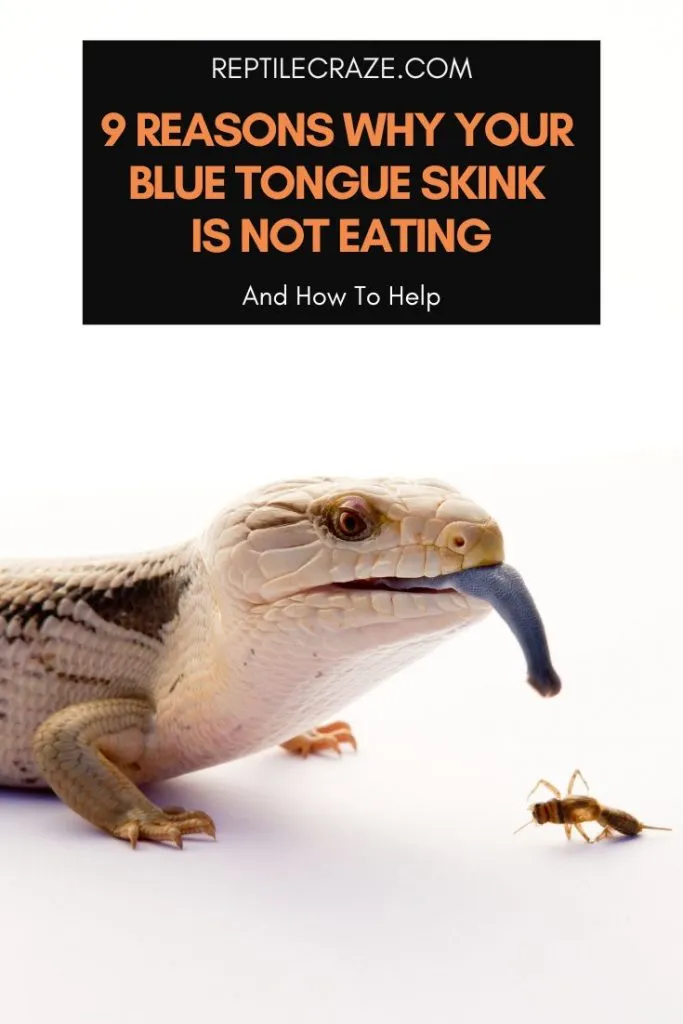
It can be worrying when your blue tongue skink refuses to eat. Are you doing something wrong? Is it sick? Do you have a blue tongue skink that is a picky eater? Sometimes, the solution to this problem is simple, other times you have to be creative to make your blue tongue skink eat.
Blue tongue skinks may refuse to eat when the
There are many possible reasons why your blue tongue skink is not eating. In this article, we will discuss these reasons and the things you can do to encourage your blue tongue skink to eat. So keep reading!
Table of Contents
Why Is My Blue Tongue Skink Not Eating?
It is good to know that you do not have anything to worry about if your blue tongue skink has been refusing
This can mean that your blue tongue skink is picky or it still had its fill of its last meal and taking its time to digest. If your blue tongue skink has not eaten for a week, then the following reasons may be behind it.
1. Incorrect Lighting Setup
Blue tongue skinks need high temperatures at least in their basking spot so they can digest
If your blue tongue skink ate a full meal prior to the next feeding schedule where it suddenly refuses to eat, it is possible that it was still unable to digest the last meal due to low temperature.
The usual suspect to this is not having UVB lights or bright lights. It is important for a blue tongue skink to have this type of light as these lights promote activity and hunger.
As these lights need to be turned off at night so as not to interrupt their sleep cycle, some owners forget to turn them back on contributing to the low temperature of the
2. Your Blue Tongue Skink Is Still New
If you just got a new blue tongue skink then surely it may feel stressed and unsure of you and its surroundings. You may offer
You will notice when you get a new blue tongue skink that may hide for the first few weeks, but as they get used to their enclosure, they will be more comfortable to eat.
Captive-bred blue tongue skinks take a shorter time to adjust to their surroundings as opposed to wild-caught ones.
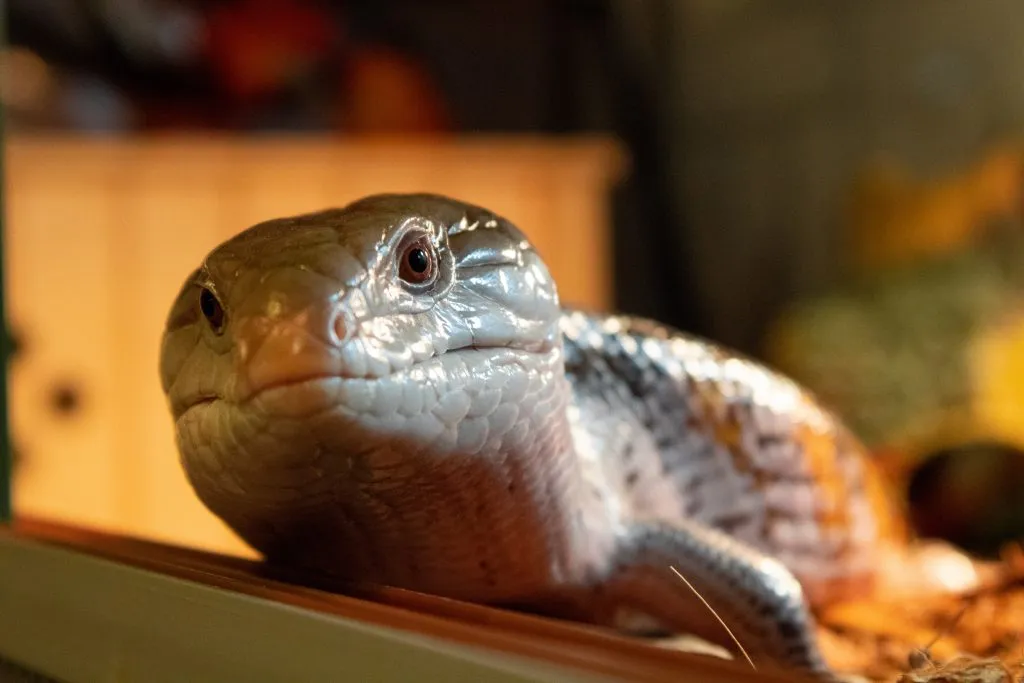
3. Your Blue Tongue Skink Is Bored With Food
Yes, you read that right, blue tongue skinks can get bored of their
Keep in mind that they should be fed a balanced diet of fruits, insects, herbs, and vegetables. So you have a lot of options to mix up their diet.
4. Your Blue Tongue Skink Is Stressed
Blue tongue skinks can be stressed for a number of reasons. It can be a temperature issue, humidity issue, too much activity outside the enclosure, the presence of other pets, etc.
Make sure that their enclosure is properly set up, with enrichment objects, hides, and a basking platform. Further, the size of the
Adult blue tongue skinks can do well in 55-gallon tanks and it should be horizontal.
If you house a baby blue tongue skink in a 55-gallon
5. It Is Mating Season
Keep in mind that blue tongue skinks become sexually mature at 12-16 months (males) and 24-30 months (females).
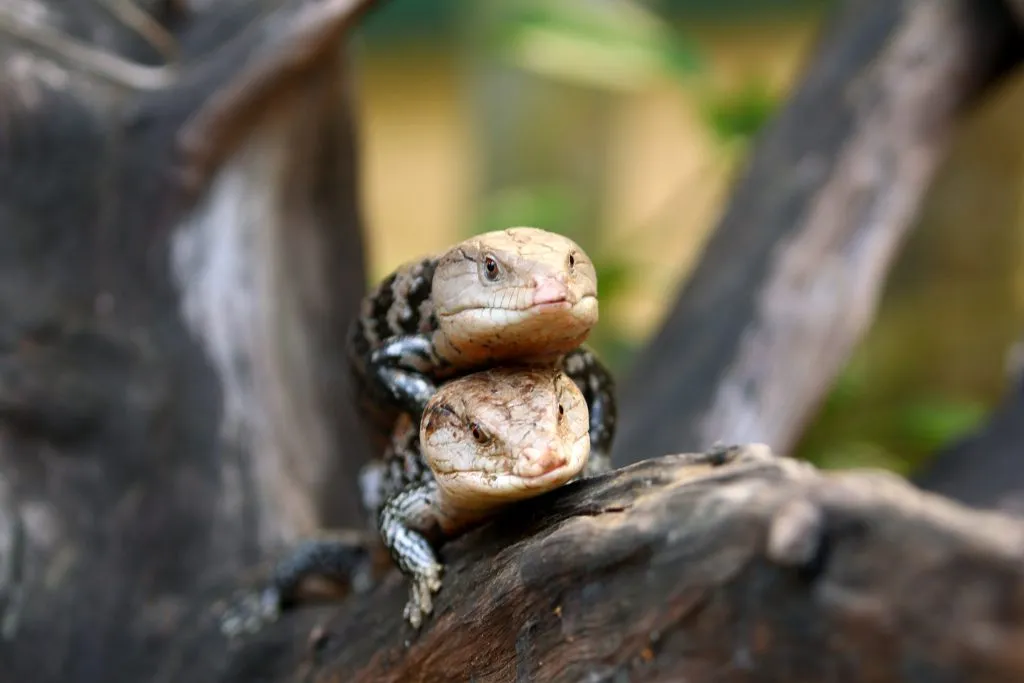
During the breeding season which can be the time when the climate becomes warmer, usually April-September, blue tongue skinks start to show breeding symptoms which include lowering their appetite.
Whether you have a blue tongue skink pair or you do not, some blue tongue skinks that are ready to mate will lower their appetite during this time simply because of breeding instinct.
6. Your Blue Tongue Skink Is In Brumation
Blue tongue skinks in captivity can also go into brumation. Even if the
Some go into pseudo-brumation without temperature manipulation, and they will slow down their metabolism and not eat.
If you are breeding blue tongue skinks and decide to brumate them, they may eat very little during the process. This behavior, may it be brumation or pseudo-brumation, is perfectly normal, so you have nothing to worry about.
When the temperature outside becomes warmer, they will go back to their normal eating habits.
7. Your Blue Tongue Skink Is In Shed
Blue tongue skinks slow down their
This is simply an uncomfortable time for them and they devote all their energy to being rid of their shed.
You can help ease the stress of your blue tongue skink during this time by adjusting the humidity level of the
Some owners provide humidity boxes so as not to disrupt the natural humidity levels in the enclosure.
You can also give your blue tongue skink a bath or give it a soak to help shed the skin. After their shed, they will go back to eating normally.
8. Your Blue Tongue Skink Is Sick
Blue tongue skinks also refuse to eat when they are sick. This can be tricky to see from the get-go as reptiles are experts in hiding their illnesses. It only gets noticed when they are already displaying symptoms.
For most illnesses, the first symptom is that they refuse to eat or they suddenly eat less. This is the case for dehydration. When they are dehydrated, their appetite also suffers.
Some signs of dehydration besides refusal to eat are slimy saliva and wrinkly skin. If rehydrating your blue tongue skink does not work and it becomes lethargic, you should immediately go to your vet.
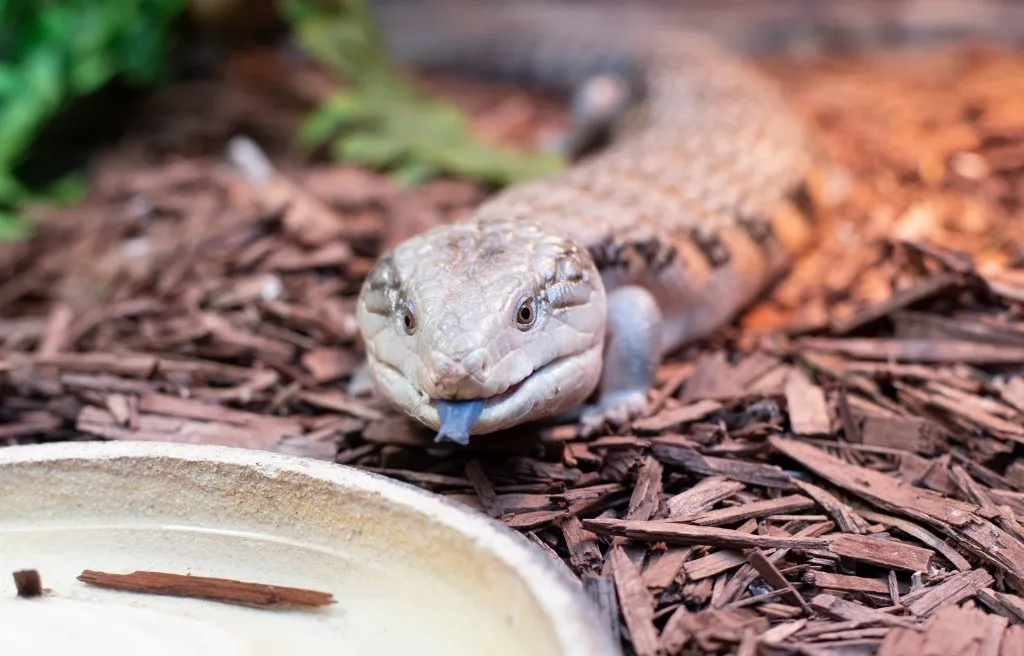
Another thing that may be the cause of your blue tongue skink not eating is mouth rot. When they have this infection in their mouth, it is extremely painful to eat.
Some signs of this are crust on the mouth, mouth scales being damaged, redness around the mouth, and yellow secretion around the mouth.
You also need to go to the vet to know if your blue tongue skink needs antibiotics.
Moreover, if your blue tongue skink has continuously refused to eat and drink for weeks and started to become lethargic but the vet has cleared it from any illnesses, it is also possible that it is dying.
You can take a look at this article to learn about the signs of a dying blue tongue skink.
9. Your Blue Tongue Skink Is Impacted
The usual cause of impaction of blue tongue skinks is accidental ingestion of substrate. This is the case as they thrive in loose substrate because they love to burrow.
Sometimes, the substrate can get into their
If this is the case, you can help your blue tongue skink by giving it a warm soak and gently massaging its underside.
If this does not work, you need a trip to the vet so it can be X-rayed to see how bad the impaction is. In some severe cases, they need to perform surgery.
This may also be a temperature issue. Blue tongue skinks may become constipated if they cannot utilize heat properly to digest.
How Do I Get My Blue Tongue Skink To Eat?
If you have covered all the reasons we discussed and found out that your blue tongue skink does not need any medical attention, then it is time to whip out your bag of tricks to entice them to eat.
Note: Refusal to eat due to brumation, shedding, and breeding do not require special techniques to encourage feeding. They will eat normally on their own after the ordeal. Pressuring them to eat may add more stress.
1. Give Your Blue Tongue Skink Time To Become Hungry
If you encountered a temperature issue wherein it dropped low enough and did not give time to your blue tongue skink to digest, just correct the temperature and wait for the next feeding schedule.
The same goes for refusal to eat due to stress. Just give your blue tongue skinks some time.
If it successfully relieved itself before the next feeding schedule, it is highly likely that it will eat during the next feeding session. Some owners, deferred offering
Based on their experience, their blue tongue skinks are already open to feeding normally in the third week. Make sure to leave water in their enclosure so they do not become dehydrated.
2. Prepare A Special Diet
A gel recipe can be helpful for blue tongue skinks that are recovering from illnesses and dehydration. This diet will make it easier for them to digest the
Note: It is not recommended to use a gel diet all the time, especially for picky eaters. Just use the recipe to entice your blue tongue skink to eat then go back to its regular diet once it no longer has any problems with eating. The acids and preservatives in the gelatin are not beneficial to blue tongue skinks.
Gel recipe:
- Blend 1/4 cup of your protein source (frozen feeder insects, commercial ready-made protein
food for reptiles) - Add 1/4 cup of frozen or fresh vegetables (dark leafy greens, carrots, etc.)
- Add 1/2 teaspoon of your chosen Calcium supplement with D3
- Get a packet of unflavored gelatin. Just follow the directions and you can also use cold water to thicken it.
- Mix all of the ingredients.
- Spread the mixture on a pan or place it on an ice cube tray. Freeze until solid.
- Thaw before feeding.
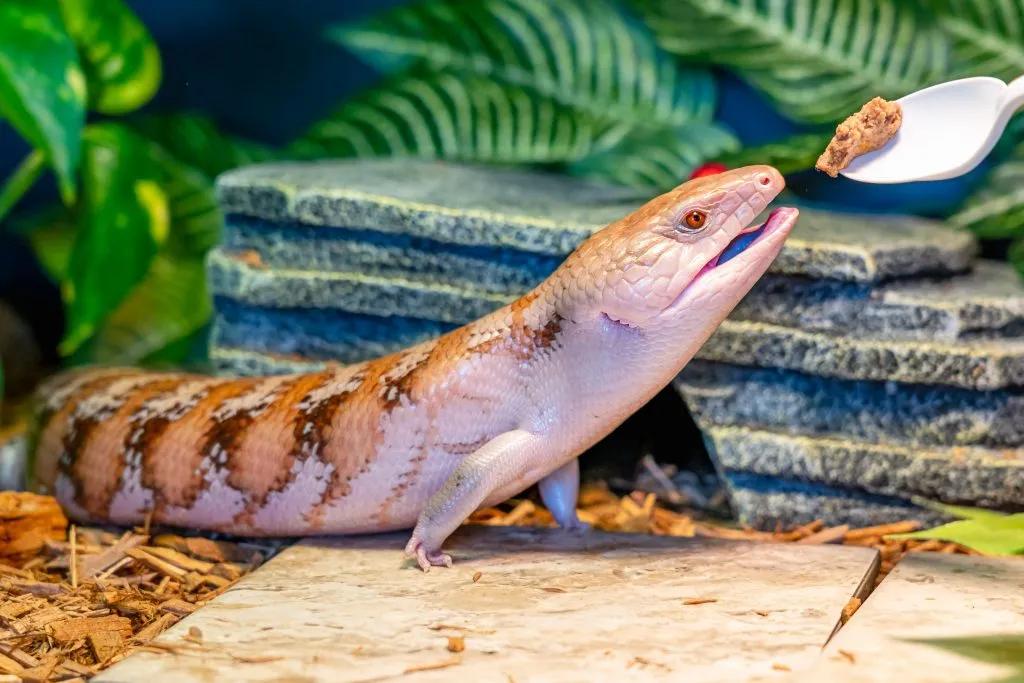
How Long Can Blue Tongue Skinks Go Without Food ?
Generally, blue tongue skinks can go 3-6 months without
Larger blue tongue skinks can survive longer because they have more fat deposits. These deposits are used for energy which takes the place of
As opposed to baby blue tongue skinks that do not have a lot of fat storage, they may not even survive 3 months without
Of course, it is unwise to leave your blue tongue skink to its bodily survival functions, when it is refusing
They may still survive for a couple of weeks, but if the illness is left untreated, the period of survival becomes shorter.
Tip: Are you planning to go on vacation? Here is what to do with your blue tongue skink.
What Do You Feed A Picky Blue Tongue Skink?
There are blue tongue skinks that are notoriously picky eaters. Some prefer high-protein
A good solution to this is to mash up the protein-rich
As green leafy vegetables are also essential to their diet compared to fruits, it is vital that they get those veggies in their system. If your blue tongue skink does not like its veggies, you can try blending or mashing them.
Some owners have found success in mashing the vegetables with dog
Giving them dog
Another tip is to roll the pieces of vegetables, especially the leafy ones into small balls. The easier that they can get to it and put it inside their mouths, the more likely that they will eat it.
Final Thoughts
Do not stress too much if your blue tongue skink is not eating. As you now know, they can go for weeks without eating when they feel that they do not need to eat.
Just make sure that this behavior is not related to an illness, and if it is, then you should go to the vet.
Give your blue tongue skinks time to feel hungry and offer it a variety of food so that it will not get bored of its diet.
- Enchi Ball Python: A Unique and Stunning Morph of Python regius - March 27, 2025
- Emerald Tree Monitor: The Enigmatic Green Guardian of the Rainforest - March 26, 2025
- The Egyptian Cobra (Naja haje): A Fascinating Serpent - March 25, 2025
